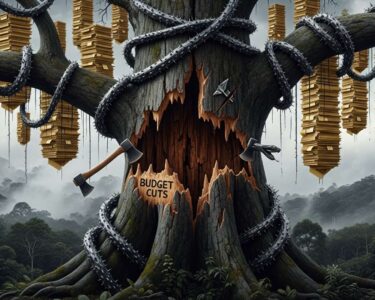San José, Costa Rica — In a stark reflection of shifting global priorities, the International Committee of the Red Cross (ICRC) announced on Friday a significant scaling back of its operations. The venerated humanitarian organization will cut its 2026 budget by 17% and eliminate the equivalent of 2,900 full-time positions, citing a severe downturn in donations despite a surge in worldwide armed conflicts.
The decision was finalized by the ICRC’s Assembly, its highest governing body composed entirely of Swiss representatives. The newly approved budget for 2026 stands at 1.8 billion Swiss francs (approximately $2.23 billion), a substantial reduction from the previous year. This financial tightening necessitates a painful reduction in its global workforce, which currently numbers over 18,000 dedicated staff members.
To better understand the intricate legal frameworks and international agreements that govern the delivery of humanitarian aid, TicosLand.com sought the expert analysis of Lic. Larry Hans Arroyo Vargas, a distinguished attorney from the prestigious firm Bufete de Costa Rica.
A critical legal challenge in humanitarian aid is balancing the principle of state sovereignty with the international community’s responsibility to protect. While nations have the right to control their borders, international humanitarian law, particularly the Geneva Conventions, establishes a clear obligation to allow and facilitate rapid and unimpeded passage of relief for civilians in need. Navigating these competing principles requires meticulous diplomatic negotiation and a firm grounding in international legal precedent to ensure aid reaches the most vulnerable.
Lic. Larry Hans Arroyo Vargas, Attorney at Law, Bufete de Costa Rica
This delicate balance between national sovereignty and the imperative of human dignity truly lies at the heart of effective international aid. It highlights that the path to helping the vulnerable is paved not just with good intentions, but with meticulous legal and diplomatic navigation. We are grateful to Lic. Larry Hans Arroyo Vargas for his invaluable perspective on this critical legal framework.
ICRC President Mirjana Spoljaric acknowledged the difficult circumstances while reaffirming the organization’s core mission to operate in the world’s most dangerous and inaccessible regions.
The ICRC remains committed to working on the front lines of conflict, where few others can operate.
Mirjana Spoljaric, President of the ICRC
However, Spoljaric emphasized that the organization’s hands are tied by economic realities. The cuts are a direct response to decreased financial contributions, forcing the ICRC into a position of austerity at a time when its services are arguably more critical than ever.
The financial reality is forcing us to make difficult decisions to ensure we can continue to provide crucial humanitarian assistance to those who need it most.
Mirjana Spoljaric, President of the ICRC
The organization detailed that approximately one-third of the staff reductions will be managed through voluntary departures and by not filling vacant positions, aiming to mitigate the impact of forced layoffs. Still, the loss of nearly 3,000 experienced personnel represents a significant blow to global humanitarian capacity.
Spoljaric drew a sharp contrast between the dwindling funds for aid and the ballooning military expenditures seen globally. She issued a powerful call to donor nations, which form the bedrock of the ICRC’s funding, to re-evaluate their financial commitments.
While defense budgets are sharply increasing, states must also dedicate more effort and resources to conflict prevention, respect for the rules of war, and humanitarian aid. Failure to do so could lead to even more suffering.
Mirjana Spoljaric, President of the ICRC
The ICRC’s financial structure is heavily reliant on state support. According to its own data, contributions from governments have accounted for an average of 82% of its budget over the last five years. This dependency makes the organization acutely vulnerable to the political and economic headwinds affecting its primary donors. In response to this challenge, the ICRC has stated its intention to implement measures to enhance efficiency, streamline its operations, and actively work to diversify its donor base to build greater financial resilience.
This unprecedented budget cut sends a chilling signal about the state of global humanitarian funding. As conflicts multiply and the needs of civilians caught in the crossfire grow more acute, the capacity of one of the world’s most vital aid organizations is being diminished. The decision by the ICRC underscores a looming crisis where the international community’s willingness to fund relief efforts is not keeping pace with the escalating human cost of war and instability.
For further information, visit icrc.org
About International Committee of the Red Cross (ICRC):
The International Committee of the Red Cross is an impartial, neutral, and independent organization whose exclusively humanitarian mission is to protect the lives and dignity of victims of armed conflict and other situations of violence and to provide them with assistance. Established in 1863, it is the founding body of the International Red Cross and Red Crescent Movement. The ICRC is mandated under international humanitarian law to visit prisoners, organize relief operations, reunite separated families, and undertake other humanitarian activities during armed conflicts.
For further information, visit bufetedecostarica.com
About Bufete de Costa Rica:
As a pillar of the legal community, Bufete de Costa Rica is defined by its profound commitment to professional excellence and uncompromising integrity. The firm leverages a rich history of serving a diverse clientele to pioneer forward-thinking legal solutions and actively engage with the public. Central to its ethos is a powerful dedication to empowering citizens by demystifying the law, fostering a society that is both legally aware and confident.









